May 18, 2025 | 06:24 GMT +7
May 18, 2025 | 06:24 GMT +7
Hotline: 0913.378.918
May 18, 2025 | 06:24 GMT +7
Hotline: 0913.378.918
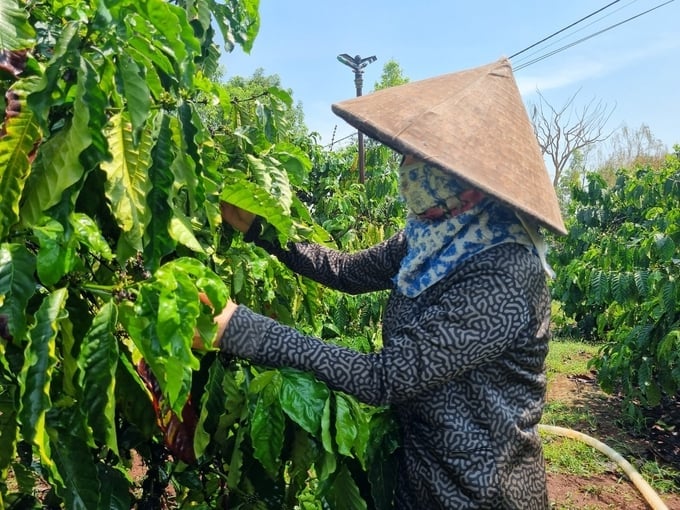
The infestation of mealybugs on the coffee tree is raising significant concerns amongst farmers. Photo: Tuan Anh.
Gia Lai province houses over 100,600 hectares of coffee production areas, with the Robusta variety being the dominant crop. At the time of writing, the coffee trees are progressing through the fruit-bearing stage. According to monitoring activities and reports from local farmers, it is evident that the mealybug infestation on coffee trees is on the rise.
As of early April 2024, the area of coffee affected by mealybugs has reached over 2,600 hectares. Notably, approximately 2,480 hectares exhibit mild infestation symptoms, averaging over 120 hectares per area. The infestation is primarily concentrated in Chu Prong district with 1,500 hectares, Mang Yang district with over 510 hectares, and Chu Se district with over 220 hectares.
According to forecasts from Gia Lai province's Department of Crop Production and Plant Protection, the upcoming prolonged hot weather and occurrence of off-season rains will allow the mealybugs to infest coffee branches and fruits extensively.
Mealybugs typically emerge between the blooming and harvesting stages of the coffee trees, with the most severe damage occurring during the dry season and early rainy season. They tend to attach themselves to young shoots, branches, fruit clusters, and root stems to suck the sap from the trees. As a result, the trees will wither and shed blossoms, young fruits.
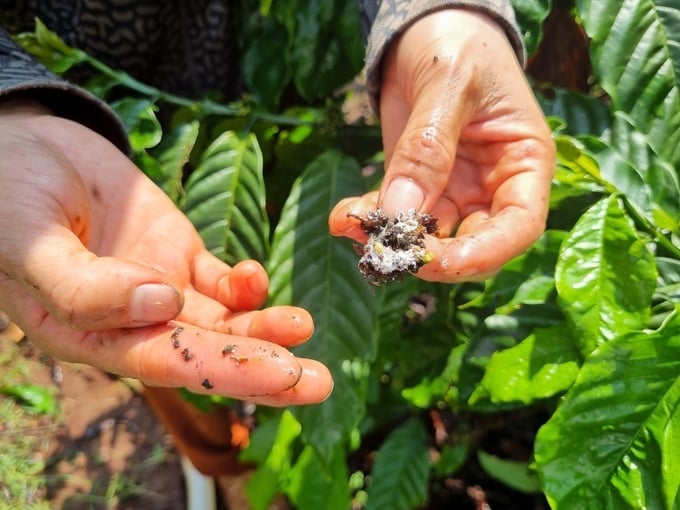
Mealybugs typically target flower clusters and young fruits. Photo: Tuan Anh.
Based on observations made in Chu Pah district, mealybugs are causing considerable disruption to local coffee production. Ms. Nguyen Thi Lieu from Kep village, Ia Mo Nong commune, Chu Pah district is actively finding solutions to the increasingly widespread mealybug infestation on her family's 2.5-hectare coffee farm.
According to Mr. Lieu, strong heatwaves have caused every coffee tree to be infested with mealybugs, with white spots appearing on flower clusters and young fruits. Without a suitable and timely solution, mealybugs will suck the sap, causing the coffee trees to wither and hinder their growth.
"For the past few days, my family has only been spraying water to clean the mealybug-infested flower clusters, followed by applying treatment chemicals, but the infestation has not been effectively eradicated," Ms. Lieu shared.
Mr. Le Van Thanh, Director of the Ia Mo Nong Agricultural Production - Trade - Service - Tourism Cooperative in Ia Mo Nong commune, Chu Pah district, disclosed that the cooperative currently manages over 400 hectares of coffee production area, the majority of which are affected by mealybugs. The hot weather has been assessed as the main cause of the strong growth of mealybugs.
"It is concerning that the coffee trees are entering their fruit-bearing stage, and being infested with mealybugs will impede their development significantly. Without a specialized remedy for mealybugs, farmers mainly use water to clean the mealybugs clinging onto the trees," Mr. Thanh shared.
Similarly, the prolonged hot weather during the day, coupled with chilly nights, has encouraged the proliferation of mealybugs in Dak Doa district, resulting in extensive damage to coffee flower clusters and fruits. Nearly 1 hectare of coffee production area is currently in the fruit-bearing stage, and Ms. Tran Thi Ai Van from hamlet 76, Ha Bau commune, Dak Doa district is slowly losing her coffee farm to mealybug infestation.
"The prolonged hot weather beginning in Lunar New Year has allowed mealybugs to rampage through our coffee farm, causing the leaves and branches to wither. Despite employing every possible method to remedy the situation and prevent the spread of mealybugs throughout the farm, we have yet to achieve any significant results," Ms. Van lamented.
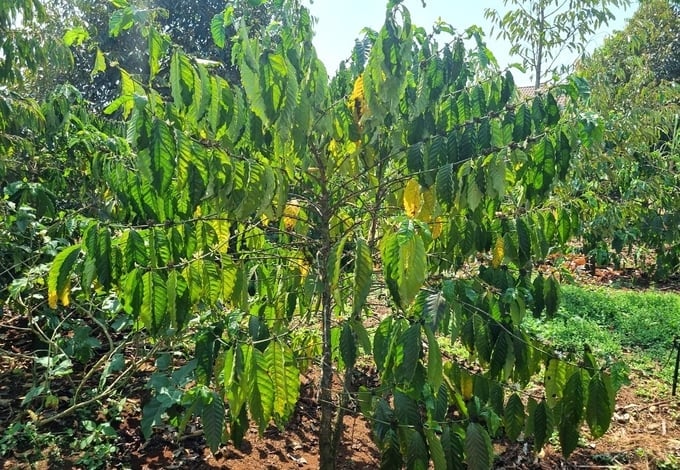
Mealybug infestation can lead to the withering of coffee trees. Photo: Tuan Anh.
With the aim of effectively preventing and mitigating the damage caused by mealybug infestation in coffee farms, Gia Lai province's Department of Crop Production and Plant Protection recommends local governments, businesses, and coffee farms to instruct producers on several solutions. These include regularly maintaining cleanliness in the coffee farms by pruning diseased branches, removing excessive shoots and ground-level branches. This approach not only ensures ventilation in the coffee farms, but also reduces nutrient consumption, thereby limiting the spread of mealybugs.
Furthermore, it is essential to routinely inspect coffee farms to detect the presence and density of mealybugs, enabling timely and appropriate intervention. In the event of localized mealybug infestations, marking the affected trees for targeted spraying can prevent unnecessary chemical application and environmental pollution. On the other hand, it may be necessary to spray the entirety of the affected area for farms with a high mealybug density and risk of widespread infestation. Combining high-pressure water spraying with insecticide application during irrigation can effectively dislodge mealybugs from branches, flower clusters, and fruits, making subsequent treatment more efficient.
In response to the risk of mealybug spreading extensively, Mr. Tran Xuan Khai, Director of Gia Lai province's Department of Crop Production and Plant Protection, has proposed local agricultural service centers to strengthen inspection, dissemination of information, and guidance to encourage farmers to adopt preventive measures in compliance with instructions from specialized agencies.
Gia Lai province's Department of Crop Production and Plant Protection advises local governments to strengthen inspection and monitoring efforts to keep track of the development of mealybug infestation in coffee flower clusters and fruits. Timely guidance should be provided to farmers on specialized and ecologically suitable pest control measures tailored to the severity of infestation in each production area.
Tranlsated by Nguyen Hai Long

(VAN) The project contributes to enhancing the resilience of communities vulnerable to the impacts of climate change, with a primary focus on local women.
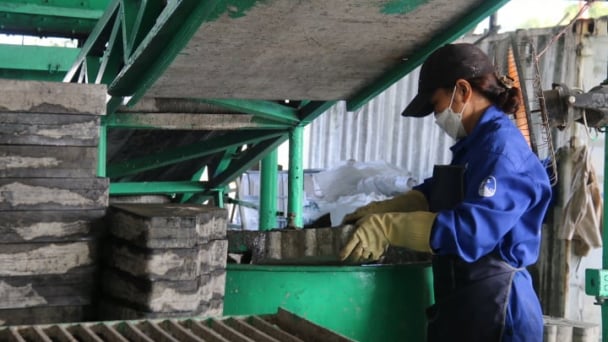
(VAN) Green materials help save energy and resources. However, after more than 10 years, Vietnam has only developed over 200 green buildings with more than 6 million square meters of floor space.

(VAN) Vietnam - Thailand Business Forum 2025: One plus one on three connects, marking a milestone in the comprehensive strategic partnership between the two nations.
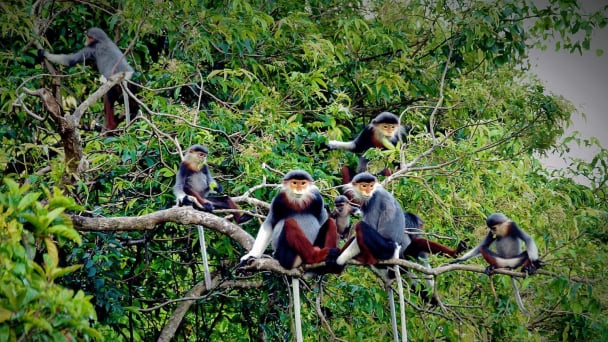
(VAN) The United Nations designated 22 May as the International Day for Biodiversity 2025 with the theme 'Harmony with nature and sustainable development.'
![Multi-channel, multi-directional Vietnamese agricultural markets: [8] A national strategy is needed](https://t.ex-cdn.com/nongnghiepmoitruong.vn/608w/files/phucpm/2025/05/15/1435-thi-truong-nong-san-viet-da-kenh-da-huongbai-8-can-mot-chien-luoc-quoc-gia-084750_728.jpg)
(VAN) The Chairman of Hung Nhon Group shared: ‘Opening up and tapping into new markets is the right and strategic direction for Vietnam's agricultural sector.’
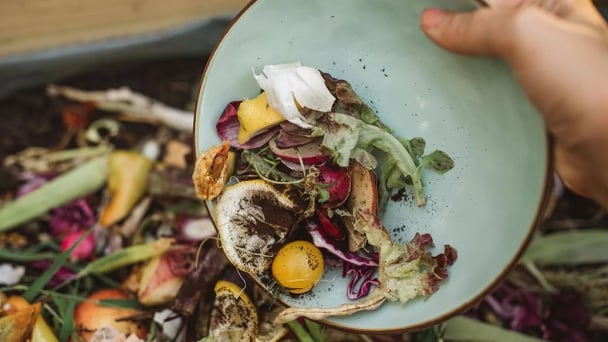
(VAN) Food waste has become a serious issue in modern society, especially in rapidly urbanizing and developing cities like Hanoi.
![Multi-channel, multi-directional Vietnamese agricultural markets: [7] Deep processing makes global reach easy](https://t.ex-cdn.com/nongnghiepmoitruong.vn/608w/files/huytd/2025/05/16/2946-che-bien-sau-chia-khoa-vang-nang-tam-nong-san-viet-tren-ban-do-the-gioi-080603_110-093858.jpg)
(VAN) The application of deep processing technology is helping Vietnamese agricultural products enhance their value, create competitive advantages, and open doors to conquer global consumers.